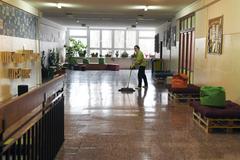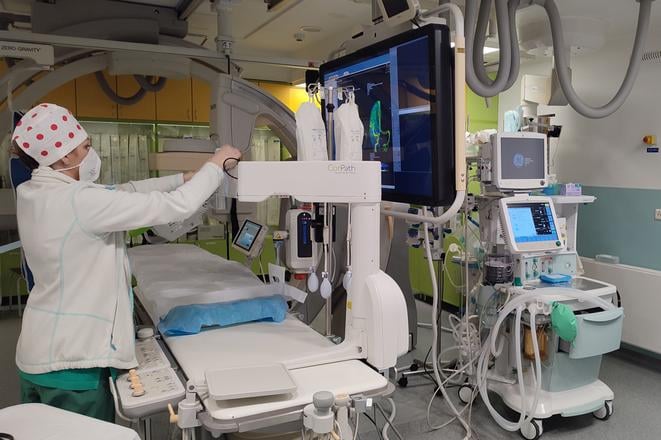On March 9, two weeks into Russia’s invasion of Ukraine, Lilia Koveina arrived in Slovakia, escaping the war. Now, she is trying to also earn enough money to live a decent life and financially support her relatives who remained behind.
With degrees in international economic relations and English from two universities in Dnipro, central Ukraine, where she lived before the fighting began, the English teacher thought it would not be difficult to find a job in Slovakia.With degrees in international economic relations and English from two universities in Dnipro, central Ukraine, where she lived before the fighting began, the English teacher thought it would not be difficult to find a job in Slovakia.
But Koveina’s plan is not going as she had hoped, even though there are few bureaucratic hurdles to her accessing the labour market having obtained temporary protection status under new legislation, dubbed “Lex Ukraine”, relating to Ukrainian refugees.
“Most employers are either looking for waitresses or kitchen helpers,” Koveina explains.
She currently lives in Sliač, a small spa town located close to Zvolen and Banská Bystrica. In Zvolen, she tried waitressing at a café. The owner laid her off after two days because she could not speak Slovak.
Lex Ukraine was very useful in the beginning, but now it is necessary to continue working on integrating refugees and their families.“
Koveina, who is teaching herself Slovak, has since taken up work cleaning for a local family and looking after their children. “I’ve only been there twice. Is it a job?” asks Koveina.
She says she is prepared to move to another town, or even another country, if she can find a decent job and a place to stay.
As of April 30, 72,624 refugees – mostly women and children – have been given temporary protection status. But only just over 5,000 have found work, mostly in low-skilled jobs.
Like Koveina, there are many other workers among the tens of thousands of refugees who have come to Slovakia whose skills could help the country stem a decades-long brain drain.
At the end of March, the National Bank of Slovakia described the integration of as many Ukrainian refugees as possible into the labour market as “a great opportunity” to reduce labour shortages in many sectors.
In 2021 the government updated national migration policy, aiming to create “an attractive environment for foreigners who are needed for the growth of our economy and society”.
Slovakia is losing out to other countries, including its neighbours, in competition for highly qualified workers, labour market expert Martin Kahanec from the Central European Labour Studies Institute (CELSI) said.
“Slovakia’s approach to attracting highly skilled workers is very conservative and based on an idea that the country can strictly select a certain type of immigrant,” he explained.
The need for more high-skilled workers is particularly acute in Slovakia’s health care, IT, and manufacturing sectors.

While employing Ukrainian healthcare workers had been a lengthy process before Lex Ukraine was passed, it was far from uncommon to come across Ukrainian medical professionals at hospitals around the country before the war.
Currently, to be employed, Ukrainian medical staff need to speak at least basic Slovak and get their qualifications recognised.
“Until these requirements are met, they can serve as interns,” Martina Pavliková from the Agel healthcare provider explained. The firm employs 36 Ukrainian doctors and nurses in its hospitals.
Cardiologist Vitalina Yarosh from Kyiv began work at Agel’s hospital in Levoča, eastern Slovakia, in mid-March. “My whole family is now working at the hospital,” she said. A local doctor helps her and the other members of her family with the language barrier, while local authorities provided them with accommodation, and their children attend a local school and a kindergarten.
Janka Bečkeiová, Director’s Assistant at the General Hospital in Veľký Krtíš, southern Slovakia, which employed 12 Ukrainian staff before the war, said that offering similar benefits will help attract Ukrainian healthcare workers to Slovakia.
Integration cannot end with Lex Ukraine
Experts say though that the recent legislative moves to help Ukrainians cannot be the end of their integration process.
“Lex Ukraine was very useful in the beginning, but now it is necessary to continue working on integrating refugees and their families,” Kahanec said.
This should involve not only employment counselling at labour offices, but also communicating with refugees about how to participate in social and political life in Slovakia, access social security, accommodation, health insurance, obtain Slovak citizenship, as well as providing places in schools and pre-school facilities for Ukrainian children.
When the Sme daily asked National Bank of Slovakia Deputy Governor Ľudovít Ódor in early April what Slovakia should do to prevent an outflow of Ukrainian refugees to other countries, he spoke about offering “a complex product”. Refugees should be able to find all the information they need in one place, he explained.
If we fail at integrating them [Ukrainian students] at universities, we will lose a lot of talent.“
Highly qualified migrants indeed choose their final destination, Kahanec noted. “They are sensitive to the overall conditions and quality of life a country provides for them and their families,” he said.
Since the start of the war, Slovakia has temporarily increased capacity at kindergartens and creches by 10 percent.
It is thought that more than 6,000 Ukrainian pupils in schools and kindergartens need help and support in their native language from Ukrainian teachers. There are almost none, though.
As well as problems with school places, another widely cited difficulty facing refugees staying in Slovakia is securing accommodation. Affordable housing was difficult to find even before the war, with a shortage of new homes in many towns.
Job offers at the border
But these problems have not discouraged everyone from finding work. Husband and wife, Vladimir and Yuliia, from Kharkiv, have taken jobs at Pixel Federation, a Slovak game development company.
Vladimir, a 3D artist, and Yuliia, an animator, impressed the company with their skills.
“For us, their command of the programmes we use, their experience, and their enthusiasm are most important,” the firm said, adding that there had been no significant problems with language barriers after taking the pair on.
The firm also helped Yuliia and Vladimir, who had applied for the jobs after searching online for work before they came to Bratislava, with health insurance and finding a Slovak language course after their arrival in Slovakia.
According to job search website Profesia.sk, there are 2,900 jobs suitable for Ukrainians on offer, mainly in the IT, manufacturing, and hospitality sectors.
Based on the group’s April data, 56 percent of job seekers fluent in Ukrainian hold a university degree.

In cooperation with the Open HR Forum initiative, Profesia.sk carried out a survey of 306 companies in March to find out more about employers’ attitudes to taking on Ukrainians.
“Most employers want to give jobs to Ukrainians,” said Profesia.sk’s Marketing Manager Martin Menšík.
In the survey, more than 80 percent of those who would not employ Ukrainians said they could not create jobs for them. Half of those reluctant to employ Ukrainians cited the language barrier.
Meanwhile, getting Ukrainians to come to work in Slovakia can be problematic in some sectors, labour experts say. Bureaucracy and imperfect public services in particular are to blame.
For example, demand for Ukrainian IT professionals is high at Slovak firms, but it is hard to persuade them to work here. Ukraine’s IT outsourcing industry has been one of the largest in the world.
“Neighbouring countries understood this a long time ago and began active headhunting in Ukrainian cities before the war began,” said Mário Lelovský from the IT Association of Slovakia.
We are dealing with humanitarian, not economic, migration.“
Slovakia is now going to attract talented people, even from Ukraine, with scholarships funded from the EU recovery plan, in addition to planned legislative changes.
Kahanec said support for Ukrainian students at Slovak universities must be a top priority. “If we fail at integrating them at universities, we will lose a lot of talent,” he said.
Lelovský suggests there is a straightforward way of attracting Ukrainian talent, including students: jobs should be offered at refugee centres to skilled Ukrainians based on their qualifications.
“We must know about all talented and skilled people as soon as they cross the border so that they don’t have to look for work like a cleaner or a cashier.”
Situation in Poland
Like Slovakia, neighbouring Poland adopted legislation in the first weeks of the war to allow Ukrainian refugees to access the country’s labour market with the minimum of bureaucracy.
Every war refugee from Ukraine registering in the country is given a special identification number which they can use to access various services. When a refugee then finds a job, their employer simply reports this to the relevant labour office.
More than a million of refugees have been given an identification number.

“The influx of refugees does not, however, respond to the needs and challenges of the Polish labour market,” said Andrzej Kubisiak from the Polish Economic Institute.
While the vast majority of refugees from Ukraine are women and children, the greatest demand on the labour market is in the construction, production, transport and IT sectors, where workforces are predominantly male.
“For now, it is difficult to estimate how many refugees will join the Polish labour market,” said Artur Skiba, president of the Antal recruitment agency. “We are dealing with humanitarian, not economic, migration,” he added.
However, there are many highly-skilled Ukrainian workers for whom special efforts should be made to keep in Poland, according to Skiba.
He admits though that the best potential employees from Ukraine could choose to work in another European country.
“It is therefore particularly important to create the best possible conditions for refugees, including help learning Polish, finding housing, and childcare for Ukrainians coming to Poland,” he said.



 The need for more high-skilled workers is particularly acute in Slovakia's health care, IT, and manufacturing sectors. (source: TASR)
The need for more high-skilled workers is particularly acute in Slovakia's health care, IT, and manufacturing sectors. (source: TASR)